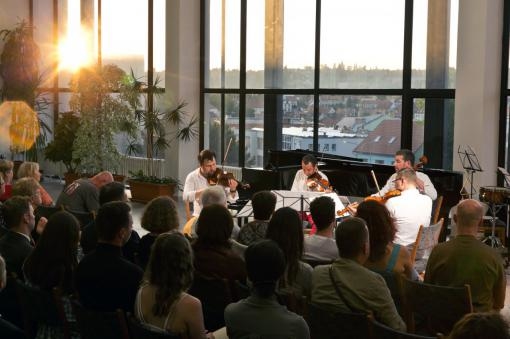Man does not live by classical music alone, as the Epoque Quartet, consisting of violinists David Pokorný, Vladimír Klánský, violist Vladimír Kroupa and cellist Vít Petrášek has been convincing us for twenty years already. For their Saturday concert, staged as part of the Concentus Moraviae festival, which took place in the foyer of the Pasáž theatre in Třebíč, the musicians also invited bass clarinettist Petr Valášek, pianist Karel Košárek and percussionist Oleg Sokolov. The programme of the evening consisted entirely of works by contemporary authors flirting in their compositions not only with musical minimalism, but also with jazz and other popular genres.
The evening was opened by the world premiere of a capricious piece entitled Coffee with Ennio M. by the guitarist and composer Lukáš Sommer. As the very title suggests, the author took inspiration from a meeting with the film music composer Ennio Morricone. The Master's fervour (depicted by Sommer in his introductory address) when talking about food, wine and coffee gave rise to a lightness-filled composition with a number of colourfully diversified passages – the composer spiced up the tonal language, for example, with expressive glissandos of cello, which later took on other instruments, by playing col legno [striking the string with the stick of the bow], using the bow on marimba, or breathing into bass clarinet. The composer chose a relatively simpler arrangement, which made it possible for the sophisticated colourful combinations to excel. The musicians in this expanded line-up had no problems with coordination, and pianist Karel Košárek, bass clarinettist Petr Valášek and percussionist Oleg Sokolov seemed to have always been part of the Epoque Quartet.

A much more seriously toned musical message came from the composer and musicologist Aleš Březina, whose song Falling Leaves in an arrangement for piano, bass clarinet, melodic percussion and string quartet followed up on the previous little piece by Sommer. In this case as well, the author was present and familiarised the listener to the genesis of the work, which represents the seasons of a year in the courtyard of the composer's house in an original and unpretentious manner. The composer used for his intention mainly unconventional onomatopoeic means. Hence, the part called Spring with its exalted trills resembled a general swarming of little and big animals; on the contrary, the suffocating heat of Summer with its mortifying stiffness was depicted by the composer in long, high tones overlapping in sharp dissonances. Similarly, the leaves of Autumn fell to imaginary ground in long imitational falling glissandos.

After the sound of the tones of a new spring, the performers introduced the composition Zrození [The Birth] by Jan Kučera. Although basically all the mentioned composers are to some extent influenced by musical minimalism, in the case of Jan Kučera's work this influence was particularly obvious. The composition Zrození is part of incidental music for a show called 13. měsíc [13th Month], which the composer created for the Spitfire Company ensemble. Long recurrent tonal structures with an occasional lengthy melodic line were, after the much more sophisticatedly composed piece by Aleš Březina was composed, an unexpected and in terms of dramaturgy perhaps not ideal slowdown of pace. Wherever Kučera's music works in conjunction with a theatre stage, suddenly this earlier assumption of the song was missing, despite the fact that in 20 16 an arrangement for string quartet and orchestra was created, which probably didn't count on any visual context. On the other hand, Jan Kučera's second piece Pljeskavica did not need any visual accompaniment. The oscillation between a warm tune and ferocious Slavic minor melodic and characteristic accompaniments amused a large part of the audience, and above all manifested the composer's formal and tectonic compositional skills.

At that time it was already clear that one of the greatest strengths of the Epoque Quartet is the style variety that the musicians are accustomed to. The composition EQ 172 by Alexey Aslamas was in fact built on a typical jazz sound. The quartet members demonstrated an immense feeling for the jazz syncopated rhythm as well as the characteristic glissando sound of solo performances. The rhythm section in particular is a frequent stumbling block for traditionally focused quartets, the Epoque Quartet, however, feels at home in here, and its grip of Aslamas' piece singled out all the jazz specifics of the composition. From the point of view of the composition itself, there was also a remarkable guidance of the violin parts, which in a united motion in the same direction truly resembled the sound of brass instruments in jazz big bands. Also, the composition Tuitytuityutyu by Petr Wajsar was partly based on jazz music. However, while the EQ 172 was a genuine jazz composition, the work of Peter Wajsar with blues and jazz inspired and hunted its musical language also in the pool of minimalism and Baroque. Here, too, the performance of the string quartet members must be emphasized, as they have remained stylishly credible in all of these contradictory positions of the author's composition.
The Epoque Quartet's concert treated the audience to an untypical quartet repertoire, which deservedly forms an important and varied segment of music production. The relentless expansion of minimalism resonates well not only with composers but also with visitors to concerts and jazz manners have been helping to cross the boundaries between musical genres and converge previously irreconcilable music camps since Stravinsky's time. The variety of musical creation knows no boundaries, and the Epoque Quartet is not afraid to hit waters which are not typical for a traditional string quartet of, all this for the joy of music lovers.
Karel Košárek / piano
Petr Valášek / bass clarinet
Oleg Sokolov / marimba, percussion
Epoque Quartet
Programme:
Lukáš Sommer: Coffee with Ennio M. – the world premiere
Ales Březina: Falling Leaves
Jan Kučera: Zrození
Jan Kučera: Pljeskavica
Alexey Aslamas: EQ 172
Petr Wajsar: Tuitytuityutyu Song
8 June 2019, foyer of the Pasáž theatre, Třebíč
































No comment added yet..